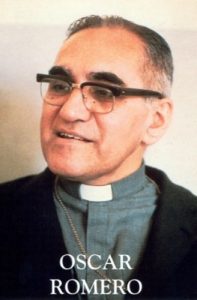HOMILY SUNDAY 04-C
Living Our Baptismal Prophetic Calling
(Jeremiah 1:4-5, 17-19; Psalm 71; 1 Cor 12:31-13:13; Lk 4:21-30)
**********************************************************
Do you ever find yourself wondering why, after Mary, only Pontius Pilate is mentioned in the Creed? Why another person like St. Peter or even St. Paul was not included instead?
Today we are invited to live fully the prophetic aspect of our baptism.
In her book, In Search of Belief, Sr. Joan Chittister OSB mentions two reasons why Pilate is included in the Creed. The first most obvious reason is for historical credibility. The trial of Jesus was neither legend nor myth. Both Jewish and Roman history attests that there was a man by the name of Jesus of Nazareth who was tried and put to death by order of Pontius Pilate.

Sr. Joan Chittister osb
The second reason strikes closer to home. Pilate is a constant reminder to us and all who say the creed, of the continuous temptation to sell out our faith, to choose expedience rather than justice; to choose self-preservation rather than risk fidelity to truth. You see, Pilate’s position was tenuous – to maintain order among a people who were oppressed and eager to throw off the burden of that oppression. So also was the position of the religious leaders of Jesus’ day who had accommodated their religious system to the presence of the Romans, and who were afraid of any change to that system, even though they themselves hated the Romans.
As Chittister puts it, “Pilate is the part of my own heart that cannot make a decision, cannot stand against the crowds, cannot pursue truth above personal exigency. Pilate is the part of us that does not stand up for good; that fails to see human decency in the drifters; the condemned, the underside of our society.”
A simple yet profound definition of being a prophet isto speak truth to power. But to do that is always a risk, always a threat to the status quo and the established system. That was the experience of Jeremiah in the first reading. He was consecrated by God a prophet to the nations. He was made a fortified city, an iron pillar and a bronze wall by God, so he could stand against the whole land, against the kings of Judah, its princes, its priests even, and the people of the land. They had all lost sight of the lofty goals to which God had called them as a chosen people, and had settled for possessions, prestige and power instead, often at the expense of the poor and the voiceless.
Such was the experience of Jesus himself in the gospel, who, filled with the Spirit of God, dared to say to the religious leaders of his time, “The truth is…”, and proceeded to speak his simple truth to their power, unmasking their unbelief and their hypocrisy. Jesus simply stated the facts – in the time of the prophets Elisha and Elijah, God’s favor went to the Gentiles, so hard-hearted had the Jewish people become in their selfish, sinful ways. And their reaction was amazing, swift and predictable: kill the prophet; get rid of the one who disturbs “our way of life.”
Is it not still that way today? Do we not face the same challenge as Jeremiah and Jesus? Was not a justification given by the past President Bush for the war in Iraq a zero tolerance for anyone who would threaten the American Way of Life? Is that not making our way of life into a god, when the well-being of other nations is disregarded and even trampled upon to protect our own selfish interests?
Sr. Chittister goes on to describe the risk taken by the modern prophet. “Call for an end to military pulverization carried out in the name of foreign policy initiatives and see what people think of you. Call for an end to life sentences for those on death row and see how people look at you. Call for demilitarization in the name of human services and see how fast you’re accused of being unpatriotic. Call for public day-care centers, wage equity, standardized promotion policies and universal health insurance instead of abortion, and see what happens then to the proclaimed concern for women’s rights. Call for a distribution of wealth in a world where profit, power and personal freedom are the gods of the day and see how quickly you lose your place at the tables of the rich and the powerful….. Neither the priests nor Pilate wanted to risk a social revolution in behalf of the poor and dispossessed. The cross, in other words, was the inevitable end – for Jesus who promoted a new, selfless ‘Beatitude Way of Life,’ and for anyone else who does the same in the face of an intransigent system.”
Chittister gives an example of a time when she was class moderator at a school that was about to induct five students into the prestigious National Honor Society. The stakes were high, as the higher the students were on the list, the more opportunity they had of getting scholarships to the college of their choice. That year there were three girls and two boys in the order girl-girl-boy-girl-boy. When the names were revealed, she was startled to see that the list had been reversed to boy-girl-boy-girl-girl. When she checked into what she thought was a mistake, the principal told her there was no mistake. He had deliberately and even smugly changed the order because he said that girls did not need an education as much as boys did, and boys needed role models more. Put bluntly, the hard work, intelligence and academic future of the girls had been sacrificed to the false god of male privilege. What bothers Sr. Chittister to this day is that she was quiet and did not protest the injustice. She realizes now that she had been Pilate in that instance.
Dom Helder Camara used to say when he gave money to the poor and oppressed, people called him a Christian. When he asked why they were poor and oppressed, however, people were quick to call him a communist.
 Oscar Romero was another church leader who went even further. A quiet, compliant professor who was made a bishop because everyone thought he would not disturb the system, he became quickly politicized and radicalized when he saw the injustice that was being inflicted on his priests, religious and on the poor in Latin America. He began to speak out boldly and clearly against the injustice, and paid the price with his life as he was shot one day by the military establishment, most certainly in collaboration with other vested interests in both the Brazilian and American government circles at that time.
Oscar Romero was another church leader who went even further. A quiet, compliant professor who was made a bishop because everyone thought he would not disturb the system, he became quickly politicized and radicalized when he saw the injustice that was being inflicted on his priests, religious and on the poor in Latin America. He began to speak out boldly and clearly against the injustice, and paid the price with his life as he was shot one day by the military establishment, most certainly in collaboration with other vested interests in both the Brazilian and American government circles at that time.
What about us? Dare we take up the challenge given to us by Jesus in the gospel, and Paul in the second reading, to make love the greatest law and motive of all? Can we put that law into action in each and every situation of our lives, no matter what vested interests or powerful persons might be disturbed? No matter how much such actions might interfere with our own comfortable way of life? That is the call from today’s readings.
The Eucharist was won for us by the broken body of Jesus and his blood that was shed for us on the cross. We cannot receive communion and worship Jesus in church, without at the same time being consecrated to live the way he lived, the values he lived, outside the church.
So, as we celebrate today, let us pray for the spiritual power to live fully the prophetic aspect of our own baptism.




We are to live fully the prophetic aspect as our own baptism because we should consecrate ourselves to the Lord Jesus Christ. We should surrender ourselves to Jesus when we are forgiven and healed by God. He will sent us messages on how to follow his teachings and to help spread the Good News out into the world. We have to be pure and free of sins to receive the communion because Jesus is present inside the Eucharist. This means we have to go through reconcilation ; being able to confess all of our sins and asking God to forgive our sins . He will bless us and heal us spiritually ; hoping we will repent and change our behaviour to receive his unconditional love. We are to live out his commandment or justice by loving one another as we love ourselves. We are to love our enemies because we have forgave them. Jesus loves us always with mercy and forgiveness. He wants us to do the same by using his experience and passion to help live out the word of God. Amen.
Thanks again for the following homilies and teachings to remain devoted to the Lord Jesus Christ by praying the spiritual power to live out his word. We should understand the power by speaking the truth about God. What a beautiful homily and thanks for sharing those pictures. Bishop Sylvain Lavoie.